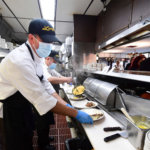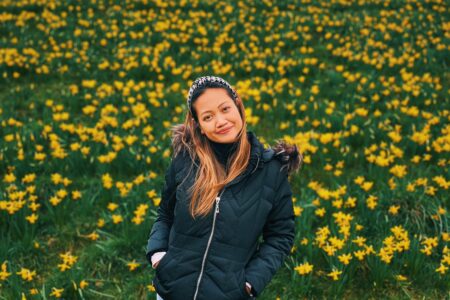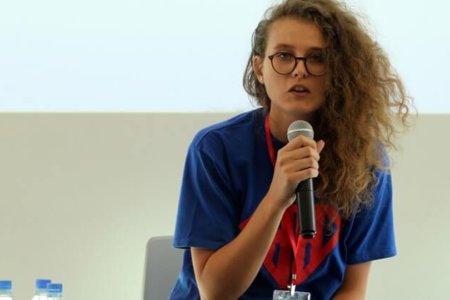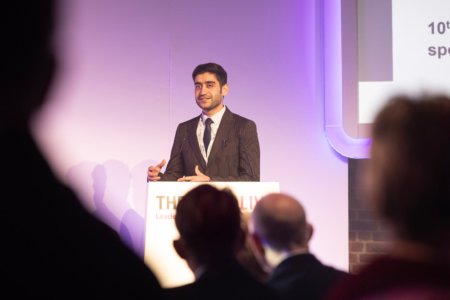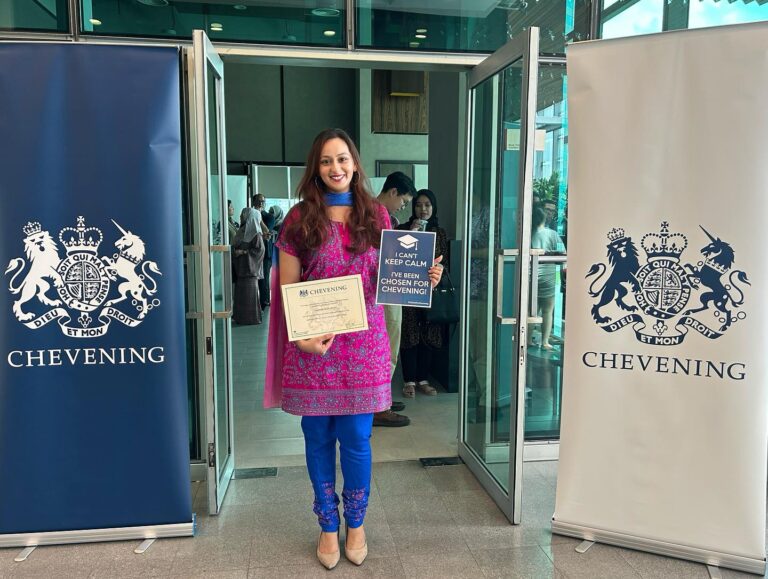
A full-ride all-paid-for UK degree – that’s what the Chevening Scholarship offers. This prestigious, fully-funded UK master’s programme allows international students to earn their postgraduate degree in one of the most popular study abroad destinations in the world.
But, the competition is fierce.
Only a select few are chosen each year based on leadership potential, academic results, and a commitment to positive change.
In the 2023-24 application cycle, around 70,000 students applied, but only about 1,500 received the scholarship. This translates to a mere 2% selection rate, showcasing the scholarship’s rigorous selection process.
For Sharon Jessy, it’s a different story — she won the Chevening Scholarship twice.
“The first time I was awarded the scholarship was in 2020, after applying in 2019,” she says. “However, due to the COVID-19 pandemic and the uncertainty surrounding it, I declined it.”
Jessy admits she was initially afraid of being blacklisted after declining the opportunity, though the decision felt right at the time.
Those awarded the scholarship in 2020 only managed to travel to the UK in January 2021. They did the first half of their programme online and the second half in the UK but even then, there were issues with vaccinations, lockdowns, and remote learning.
Jessy, who foresaw these challenges, wanted the full study-abroad experience.
“I was honest with the Chevening committee, saying that I didn’t think it would fulfil the purpose of studying abroad,” she says.
“They were very understanding and said they would give my spot to someone else on the list.”

Jessy discovered the Chevening Scholarship through social media. Source: Sharon Jessy
In 2022, she applied again. Having been promoted to senior associate at the law firm she was working at, she sought to enhance her global legal knowledge.
But first, she had to secure the scholarship and go through the entire application journey again.
Selecting Chevening Scholars takes a minimum of eight months. The application deadline is in November, and applicants are only conditionally selected for an award in the following June.
It’s a long period for many things – good and bad – to pop up.
For Jessy, it was a whirlwind of life and career events.
She had to figure out when to end her rental agreement in Malaysia and persuade her employer about a potential sabbatical. She got married during that period too.
“I applied in August 2022, submitted my application in the first week of November, got engaged the next week, and was shortlisted for an interview in February 2023, a week after my dad’s sudden passing,” says Jessy.
“I then got married in April and learned about my scholarship acceptance in June. I had to immediately make handover arrangements for my files and clients at my law firm and left for King’s College London at the end of August 2023.”
Thankfully, her family and husband supported her ambitions.

Jessy always dreamt of studying in the UK, and thanks to the Chevening Scholarship, she could live her dream. Source: Sharon Jessy
Her early education and background
The eldest among three siblings in her family, Jessy didn’t come from a wealthy background; her late father worked as a bank officer, and her mother is a school teacher, so finances were often tight.
But that never stopped her from dreaming and working towards studying abroad, even when her parents told her that they couldn’t afford to send her to a private university, let alone one in the UK.
After all, an international student’s tuition fees for the average undergraduate programme in the UK cost approximately 22,200 pounds (US$29,024) per year — that’s 66,600 pounds (US$87,072) for a three-year programme without including the cost of living and other expenses to it too.
“Accepting this was very difficult because I felt like I had to make sacrifices so that my two brothers could have more opportunities,” she says.
Despite scoring straight A+ grades in the Sijil Pelajaran Malaysia (SPM), a national examination equivalent to GCE O Level, she couldn’t apply for any scholarship to go abroad.
The Malaysian government didn’t offer scholarships for overseas programmes that year.
Local scholarships were tough to get, too, and she didn’t receive any from private organisations.
“However, I was fortunate to be offered a government matriculation (foundational programme in accounts) and eventually attended University Malaya, Malaysia’s best public university under a government scholarship,” she says.

When Jessy received a government scholarship, her parents advised her to choose law over accounting, believing it suited her better. Source: Sharon Jessy
While at university, Jessy was active in debates and moot court competitions, representing Malaysia in international tournaments like the International Criminal Court Moot held in The Hague and the Phillips C Jessup Moot Court competition in Washington, DC.
After winning the national rounds, her team qualified for these events with support from the government, which funded their participation.
Over three years, Jessy was fortunate enough to visit around 30 countries, including Greece, the UK, New Zealand, Australia, South Korea, Netherlands, Taiwan, China, and Japan, broadening her horizons at a young age.
Despite all this, she had a burning desire to study abroad, which continued to motivate her throughout her university years. So when she got the Chevening Scholarship in 2020 and 2023, she couldn’t be happier.
We caught up with Jessy to learn more about her Chevening Scholarship application process and her future goals.
Can you share tips on acing the four 500-word essay writing assessments?
For the essays, there are two key aspects they are looking for.
The first part is about presenting yourself on paper, which is difficult. I remember having to rewrite my application three to four times. The first draft looked robotic and didn’t represent me accurately. The second draft wasn’t much better. It was only in the third draft that I felt I was being more vulnerable and honest.
I detailed specific experiences, including feedback from people and stakeholders involved, and discussed the intangible impacts — not just statistics but also emotional or mental reactions.
Chevening wants to see the invisible aspects of your experiences. This is crucial because they want to understand you as a candidate, and honesty is the only way to achieve that. There are no strict criteria or structure — just be yourself and focus on how you articulate your message.
The second aspect is coherence.
The application consists of four essays, each focusing on different aspects of your journey: leadership, networking, past studies/current work, and future aspirations. These essays are like different chapters of the same book — your book. They want to see you in all these dimensions because the essays address different questions. Each essay should be interrelated and interdependent, presenting a cohesive and comprehensive picture of who you are.

Jessy explains that Chevening selects scholars to represent the brand globally and network professionally and personally. They organise social events like the London Afternoon Tea Bus to build connections, offering a scenic tour of the city’s landmarks over tea and scones. Source: Sharon Jessy
Do you have any tips for the Chevening Scholarship interview?
In the two interviews, I went for — the first one in 2020 and the second one in 2023 — their only purpose was to get to know the real you in person rather than on paper and they both have to be the same person.
They can tell if you are lying or if you’ve prepared answers to questions which is why they sometimes lead with casual questions like which museum you want to visit first or which English celebrity you hope to meet on the streets.
I remember they asked, “In the UK, which state or area do you want to visit the most?” And I said I want to go to Cambridge. I explained it was because I had been there before for debates and liked it.
The panel also wants to see how you carry yourself and converse with them, they want to see your personality because they don’t want to send robots representing Malaysia, they want to send leaders and networkers, candidates who can represent Malaysia and the Chevening brand well.
So, I just talked about things in a very informal setting when they asked me questions.
The panel will also ask why you chose the Master’s programme and what you intend to do upon your return. This is important because they want to understand how your current role would benefit from your chosen Master’s course or, if you’re choosing to pivot, how this course will serve as the catalyst for that change.
They also want to know what you plan to do with the knowledge you gain — it’s important to provide nuanced examples when explaining the former and demonstrate the intended impact of your future plans.

Beyond academic reputation, Jessy wanted to study in central London to fully experience city life, and King’s College appealed to her because of its prime location. Source: Sharon Jessy
Why did you choose King’s College London for your LLM?
After speaking to people I know who studied in the UK, worked there, or had experience with KCL either at the undergraduate or master’s level, I discovered that the financial pathway is not just taught from an academic perspective. It is actually a practical course.
The lecturers and professors are not only academicians but also practising lawyers. I had the privilege of learning from a partner at Herbert Smith, a global law firm with branches worldwide. I also had the opportunity to learn from a partner at Skadden, who would fly from the US to the UK just for our classes. These high-powered law practitioners provided the learning experience I wanted because I was already practising at my law firm.
I didn’t want to return to a purely academic setting; instead, I wanted teachings that I could directly apply to my day-to-day practice as a lawyer. Like how you would think about what kind of problem-solving approach to take: how do you then advise your client in the most comprehensive form? All these skills, I feel, can be imparted if you come from a practising background, and that’s what they did.
The second reason is that I wanted to study in the heart of London and fully experience living in the city.
KCL was attractive because the campus is centrally located. It is in the same area as landmarks like London Bridge, Tower Bridge, Piccadilly Circus, and Trafalgar Square, all within a 10-minute walk. I wanted to immerse myself in the daily experiences of travelling to college and interacting with the city.
In what ways has studying in London, a global hub for law, enriched your perspective on the legal field?
Malaysia is a Commonwealth country, and we follow many developments in case law, particularly in litigation. Our case laws are local or from other Commonwealth countries like the UK. In my line of work, when there are gap in our local law, we often look to practices and case laws from the UK. Therefore, studying the theoretical concepts and principles that I learned during my studies will likely impact how I approach my work at my current law firm in Malaysia.
I do litigation, which involves drafting written submissions, opinions, and statements of claim when initiating an action against someone or a company. I believe that the developments in UK law and what I studied theoretically will influence my approach to cases moving forward.
The practical focus of my course, which emphasised problem-solving, advisory work, and considering the consequences of non-compliance or policy implications, has equipped me with important skills that will be useful in my work in Malaysia.

Jessy is grateful for the International Chevening community’s support, which helped her feel connected while studying and allowed her to bond with wonderful people beyond academics. Source: Sharon Jessy
What are your key takeaways from this experience?
My Chevening journey was a wonderful break for both my personal growth and professional development.
The key takeaway from this experience is that my Chevening year was anything but conventional. It came with many challenges, such as losing my dad, getting married, moving houses, and then going abroad away from my husband and family. Despite these hurdles, I still consider it a profoundly positive experience.
Managing these aspects of life while balancing my studies was challenging but incredibly rewarding.
It taught me a great deal about my own resilience and determination. I made lifelong friendships and connections, not just on a professional but also personal level. These are people with whom I will be in touch moving forward. I hope the same for any aspiring sharing scholar applying this year; I hope you keep this in mind and do the same as well.






